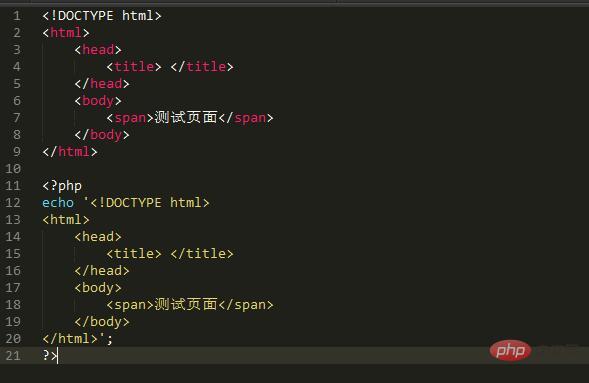What are the ways to embed php into html?

1. Single/double quotation mark enclosing method
This is the most basic method. The usage is as follows:
<?php
echo '
<!DOCTYPE html>
<html>
<head>
<title> </title>
</head>
<body>
<span>测试页面</span>
</body>
</html>
';
?>This is the simplest method, just wrap it in single quotes.
As for the difference between double quotes and single quotes, it is that the former parses the variables within the quotes, while the latter does not parse the variables within the quotes. See the example below
<?php $Content='Hello!'; echo "$Content"; echo '<br>'; echo '$Content'; ?>
Output:
1 Hello!
2 $Content
It can be seen that the variable name in the string surrounded by double quotes is automatically resolved to Variable value, while surrounding it with single quotes still displays the variable name.
There are two disadvantages to writing this way:
1. If the output content contains single/double quotation marks, it will be extremely difficult to process, because PHP cannot determine whether the quotation mark belongs to The program still outputs content, so an error will be reported.
2. Some modern text editors (such as SublimeText) will not be able to syntax color the output content surrounded by quotation marks. If there are some formatting problems, it will be extremely difficult to find. The picture is a screenshot of SublimeText3. The top one is the normal coloring, and the bottom one is the coloring surrounded by quotes.

2. Embed PHP program blocks in HTML (recommended)
This is a very suitable method. And this method is widely used in situations such as WordPress templates. It is also more convenient to write. Just write the relevant code directly where it needs to be output, as follows:
<?php
//首先在这里写好相关的调用代码
function OutputTitle(){
echo 'TestPage';
}
function OutputContent(){
echo 'Hello!';
}
//然后再下面调用相关函数就可以了
?>
<!DOCTYPE html>
<html>
<head>
<title><?php OutputTitle(); ?></title>
</head>
<body>
<span><?php OutputContent(); ?></span>
</body>
</html>I think this method is the best among the three methods, but this The disadvantage is that if there are too many such code blocks, it will seriously affect program reading.
3. Use front-end template engine
As the importance of front-end is increasing day by day in the entire web development, front-end/back-end engineers are gradually separated into two professions , so in order to ensure that front-end/back-end engineers can cooperate with each other and make the things developed by front-end development and back-end development more perfect, a series of front-end template engines have gradually been spawned, such as Smarty. The implementation code written using Smarty is very readable, which makes the separation of front/back end more efficient and convenient. Interested students can search to learn more.
Recommended tutorial: PHP video tutorial
The above is the detailed content of What are the ways to embed php into html?. For more information, please follow other related articles on the PHP Chinese website!

Hot AI Tools

Undresser.AI Undress
AI-powered app for creating realistic nude photos

AI Clothes Remover
Online AI tool for removing clothes from photos.

Undress AI Tool
Undress images for free

Clothoff.io
AI clothes remover

AI Hentai Generator
Generate AI Hentai for free.

Hot Article

Hot Tools

Notepad++7.3.1
Easy-to-use and free code editor

SublimeText3 Chinese version
Chinese version, very easy to use

Zend Studio 13.0.1
Powerful PHP integrated development environment

Dreamweaver CS6
Visual web development tools

SublimeText3 Mac version
God-level code editing software (SublimeText3)

Hot Topics
 CakePHP Project Configuration
Sep 10, 2024 pm 05:25 PM
CakePHP Project Configuration
Sep 10, 2024 pm 05:25 PM
In this chapter, we will understand the Environment Variables, General Configuration, Database Configuration and Email Configuration in CakePHP.
 PHP 8.4 Installation and Upgrade guide for Ubuntu and Debian
Dec 24, 2024 pm 04:42 PM
PHP 8.4 Installation and Upgrade guide for Ubuntu and Debian
Dec 24, 2024 pm 04:42 PM
PHP 8.4 brings several new features, security improvements, and performance improvements with healthy amounts of feature deprecations and removals. This guide explains how to install PHP 8.4 or upgrade to PHP 8.4 on Ubuntu, Debian, or their derivati
 CakePHP Date and Time
Sep 10, 2024 pm 05:27 PM
CakePHP Date and Time
Sep 10, 2024 pm 05:27 PM
To work with date and time in cakephp4, we are going to make use of the available FrozenTime class.
 CakePHP File upload
Sep 10, 2024 pm 05:27 PM
CakePHP File upload
Sep 10, 2024 pm 05:27 PM
To work on file upload we are going to use the form helper. Here, is an example for file upload.
 CakePHP Routing
Sep 10, 2024 pm 05:25 PM
CakePHP Routing
Sep 10, 2024 pm 05:25 PM
In this chapter, we are going to learn the following topics related to routing ?
 Discuss CakePHP
Sep 10, 2024 pm 05:28 PM
Discuss CakePHP
Sep 10, 2024 pm 05:28 PM
CakePHP is an open-source framework for PHP. It is intended to make developing, deploying and maintaining applications much easier. CakePHP is based on a MVC-like architecture that is both powerful and easy to grasp. Models, Views, and Controllers gu
 HTML Table Layout
Sep 04, 2024 pm 04:54 PM
HTML Table Layout
Sep 04, 2024 pm 04:54 PM
Guide to HTML Table Layout. Here we discuss the Values of HTML Table Layout along with the examples and outputs n detail.
 CakePHP Creating Validators
Sep 10, 2024 pm 05:26 PM
CakePHP Creating Validators
Sep 10, 2024 pm 05:26 PM
Validator can be created by adding the following two lines in the controller.






